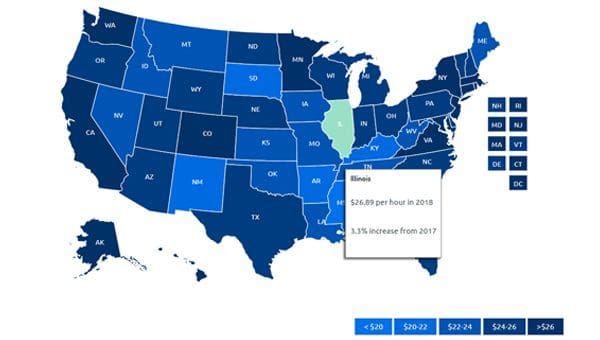It’s National Volunteer Week, and Independent Sector just released the new Value of Volunteer Time of $25.43 per hour.
You might wonder, aren’t volunteers giving their time and effort for free? Why are we associating a monetary number to it?
We calculate this figure each year because volunteers are so critical to the quality of life in all our communities. Just like a check or a pledge card, volunteers are a vital resource that help nonprofits deliver on their mission. Board members, committee members, and community volunteers contribute in unimaginable ways.
 For example, in South Carolina, a single volunteer hour represents $23.21 of value, and that’s up 4.5% from last year. To put that into perspective, we reached out to one of our members, the United Way of Greenville County. Last year, they had more than 13,000 volunteers. Those volunteers gave roughly 45,000 hours of service. So, volunteers have provided more than $1 million to the United Way of Greenville County and the communities they serve.
For example, in South Carolina, a single volunteer hour represents $23.21 of value, and that’s up 4.5% from last year. To put that into perspective, we reached out to one of our members, the United Way of Greenville County. Last year, they had more than 13,000 volunteers. Those volunteers gave roughly 45,000 hours of service. So, volunteers have provided more than $1 million to the United Way of Greenville County and the communities they serve.
Multiply that by thousands of schools, clubs, places of worship, shelters, museums, health centers, and millions of other nonprofits, volunteers strengthen our communities and contribute to people thriving in communities in South Carolina and around the country.
One reason we calculate the value of volunteer time is because it reminds us that volunteering may be priceless, but it isn’t free. Volunteers contribute real value, and we need to recognize that. When businesses give workers time off for volunteering, they’re making a tangible contribution, and we want to say, “thank you.”
But there’s also a note of warning here: Volunteering is one of the best measures for the health of civil society, because it tells us how involved and how invested people are in their communities. When you volunteer, you’re not waiting for someone else to improve life in your community – you’re taking matters into your own hands. We see the promise of our country through the contributions of individuals coming together to solve problems, help others, and advance the common good.
By this measure, civil society isn’t faring so well. Total volunteer hours are up, but the percentage of people who volunteer is going down. According to the University of Maryland’s Do Good Institute, the volunteer rate nationally has slipped from about 29% to about 25%. Based on an adult population of 252 million, that means more than 10 million Americans have stopped volunteering for one reason or another.
South Carolina, for example, is mirroring the national trend: From 2009 to 2015, the volunteer rate declined by about four percentage points and now stands below 23%. That represents a drop of about 160,000 volunteers – more than the population of Columbia and Lexington combined.
The national volunteer rate isn’t the only thing going down. The giving rate is dropping at the same time – down from 67% in 2000 to 56% in 2014. Total dollars are up, which is a good thing, but only because the most affluent Americans are giving more and not because more Americans are giving, and that’s not a good thing. Whether it’s giving or volunteering, you want to see everyone participating in civil society – you want to see everyone saying, “I have a stake in my community and I’m committed to doing what I can to make this a better place.”
When increasingly the richest people are participating in that way, we have a less healthy civil society and, as a result, democracy.
As individuals, we can always reflect on these numbers and consider what each of us can do to give back more to our communities in different ways. But there are ways our federal policies can also encourage volunteering.
As a federal policy leader, Independent Sector has been advocating for years now to raise the volunteer mileage reimbursement rate.
Businesses can reimburse their employees at a rate of 54.5 cents per mile, but volunteer mileage has been fixed at a mere 14 cents per mile for over two decades. What does that say about the way we value volunteers? If you’re driving for business, every mile is 4 times more valuable than if you’re driving to make life better for another human being?
This federal law hurts nonprofit organizations’ ability to attract this valuable resource by severely limiting how much they can reimburse volunteers for donated mileage. And we hope Congress can change that.
Learn more about the value of volunteer time and ask Congress to take action at independen1stg.wpengine.com/valuevolunteers.


